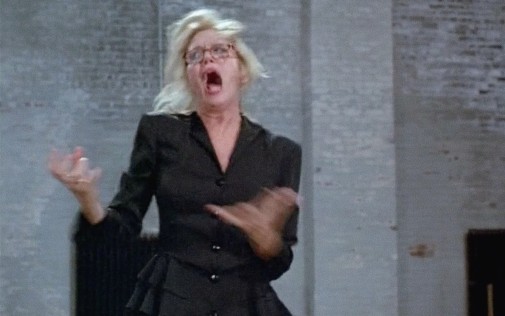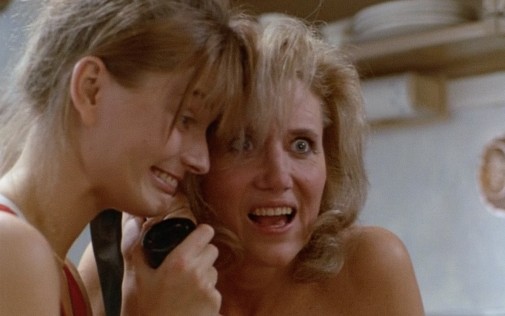The next Supporting Actress Smackdown will focus on the contenders of 1987. Before that celebration of great acting at the margins, we'll be exploring the cinematic year, its glorious pictures, and memorable Oscar races. Speaking of which, one can't discuss 1987 in the context of awards, without mentioning and paying respect to one of the ballsiest campaigns ever made by an actress. Through her sheer will, impressive determination, and tireless ambition, Sally Kirkland managed to conquer a Best Actress Oscar nomination for Anna, a little-seen American indie about an aging performer.
First things first, before we delve into Kirkland's pursuit of little golden men, we should appreciate the work for which she was recognized. The movie is discussed nowadays to snicker at the thirsty campaign, but it's a masterclass of acting...
It helps, of course, that the drama centers on the labor and the pain of performing, whether for a live audience or a movie camera. The script, written by Agnieszka Holland and Yurek Bogayevicz, was inspired by the Polish actress Elżbieta Czyżewska and it depicts the constant disappointments of its titular character.

Anna was once a promising star in Czechoslovakia, earning raves for her work in film and on stage. However, a whirlwind of political schisms, doomed romance, and traumatic oppression ended with her exiled in America. There, we find her middle-aged and destitute, desperately looking for a job as a theatre actress in New York. If the movie were just an observational character study, it would probably be more well-regarded since its deranged flourishes of melodrama prove to be the picture's undoing. By the end, we have a soap-opera-ish spin on the All About Eve model - the downfall of a consummate diva reflected in the rise of a lying ingenue (played by 80s supermodel Paulina Porizkova).

Whatever one's misgivings about Anna may be, the power of its central performance is undeniable. Kirkland is majestic as the Czech ex-pat, moving through the melodrama like a hurricane that leaves no survivors behind. As long as the camera's focused on her, the film is brilliant. Even its opening minutes reflect this by intercutting between the older and the younger woman of the story. The footage centered on Anna is amazing, a spectacle of flailing limbs and hurried panic as the actress tries to ready herself for an audition she's already late for. In contrast, there's something comparatively listless and clichéd about the other, younger woman.

Kirkland is never small or subdued in this part, choosing to go big or go home. Her accent is thick, her emotion shines and burns like hot lava, her movements expressionistic, and her face a sculpture of ever-changing plasticity. It's simply impossible to take our eyes off of Kirkland, even if Anna's story proves to be little more than a procession of humiliation and martyrized suffering. Witnessing the performance is akin to watching a woman be weighed down by disillusion after disillusion, each sliver of hope existing only as a prelude to more misery. When it all becomes too much to bear, she cracks and the result is something worth seeing.

That's not to say that Kirkland's performance is one-note or monotonal. While there's a constant undercurrent of delicate sorrow, the actress finds variation in Anna's plight. She isn't afraid to add twists of humor or even grotesquerie to the drama. Her audition is mortifying and full of sullen rage, but it's also funny. On the other hand, a meeting with an old teacher blossoms with surprising tenderness. In another scene, one can't help but be charmed by the giddiness that Kirkland brings to a frisky phone call. When she looks at old pictures of herself, it's as if she's looking at a ghost, with the actress projecting horrified awe and a hint of curiosity. Then there's a calm moment in bed, a trip down memory lane that's as tragic as it is biting. I could go on describing genius moments like these, for there are plenty.
What a performance!

Still, the film's not very good as a whole, and, being an independent production, it feels like one of those flicks that are bound to be forgotten by awards and audiences alike. That's what would have happened to Anna if it weren't for Sally Kirkland who, realizing she had delivered the performance of a lifetime, did her damned best to enshrine her achievement in golden accolades.
The actress' efforts were almost militant in their unabashed fervor, starting a grassroots campaign for the Oscar. First, she wrote letters to everyone she knew who was an Academy member, enlisting the help of friends in the promotion of her work. Some even say she wrote to every single member of AMPAS.

Furthermore, Kirkland would talk to any journalist that was willing to shine the spotlight on her, doing more for her little movie than many big-shot promoters ever did for studio blockbusters. She hired two press agents and paid for ads out of her own pocket in a similar fashion to Melissa Leo in 2010, called in favors from Andy Warhol and Joan Rivers, and attended every event she was invited to. Hell, she might have even appeared in some she wasn't invited to. Dale Olson, an experienced publicist, threw a dinner party for Sally Kirkland which was so successful and talked about, he later made sure to remark that it wasn't his chicken cordon bleu that won Kirkland her accolades. It probably helped, though.

For an actress in her forties with only minor fame, Anna was both a godsend and a challenge. Most of the movie's reviews focused on Kirkland's show-stopping work, but the micro-indie was not the sort of picture AMPAS was honoring in the 80s. That was a decade where the ballots were always full of stuffy epics and musty costume dramas, showy biopics, inspirational tripe, sentimental triumphs, and big-budget romance. Anna doesn't fit in any of those boxes. It still feels surreal, 33 years later, that the movie is an Oscar nominee.
It might have felt surreal for Kirkland, too. In 2012, when interviewed about her campaign, the actress talked about what was going on in her head during the hours before the ceremony. She said: "At the Oscars, there were all these movie stars emerging from their limos, and then there was me. I felt like Cinderella. The greatest part was the feeling to be in the same Oscar category of these women that I was a huge fan of." Kirkland got the Globe win from the HFPA, and a Spirit Award too, but Hollywood's most coveted trophy went to Cher instead, for her work in Moonstruck.

All this to say that we shouldn't laugh or deride Sally Kirkland's Oscar campaign. It's easy to be scornful at her naked hunger for the award, but that feels disrespectful as it obfuscates the legacy of a truly great performance. Campaign or no campaign, I'd vote for Kirkland out of the five Best Actress nominees of 1987. That's saying quite a lot, considering that's one of the greatest lineups in the category's history, one where every nominee could have been a winner for the ages. Cher's victory is wonderful in its own way, but let's not forget that Sally Kirkland's fight for the Oscar was an actress' valiant struggle to get the recognition she deserved.
